Drive sales on autopilot with ecommerce-focused features
See FeaturesRead summarized version with
There are plenty of high-quality Sender alternatives to start your email marketing journey or migrate to for more advanced features.
Sender’s appeal is its affordability for mass email campaigns alongside automations, such as abandoned carts and order confirmations. It covers basic email requirements, but big and growing stores can find that it doesn’t cover the customer journey stages they need to drive revenue.
Omnisend supports more ecommerce automations and workflows. Other alternatives to Sender, like Brevo, Moosend, and MailerLite, also offer unique features worth considering.
Join us below to discover the best Sender alternatives in 2026 and guidance on choosing one to achieve your business goals.
Quick sign up | No credit card required
What is Sender?
Sender is an email marketing tool for ecommerce that combines email campaigns, SMS messaging, and automation features to cover the entire customer journey, from acquiring leads to growing sales and building relationships.
It’s popular with start-ups and newcomers thanks to its generous free plan (15,000 emails/month) and a Standard plan starting from $10/month with multi-user access.
Standard features across all plans include email campaigns, email automation, pre-built workflows, automation splits, unlimited segmentation, and access to all email, popup, and form templates (plus a drag-and-drop editor).
G2 users rate its ease of use, customer support, and affordability, but it isn’t without niggles, with some users reporting deliverability problems and counterintuitive design tools.
When might you want to migrate away from Sender or skip it? If you’re a large ecommerce store or have complex automation requirements. Only its Professional plan (starting from $20/month) has advanced automation and priority support.
Key factors when choosing a Sender alternative
Consider these factors when considering and comparing Sender alternatives:
Pricing and free plans
Some Sender alternatives have free plans, others offer a free trial. Free plans are preferable as you get more time to test. Free trials have a higher risk of wasting your time and committing you to a platform that doesn’t have the tools you need.
Review each platform’s plans for any feature restrictions. Some, like Omnisend, provide all standard ecommerce features for free, while others, such as Brevo and Mailchimp, hide features behind more expensive plans.
Play around with the email and contact allowances on paid plans to see how their prices jump the more you add. Use Sender as your benchmark — 1,000 contacts is $20/month on the Professional plan and rockets to $35/month for 2,500.
Automation capabilities
Sender’s free and Standard plans include nine pre-built automation workflows:
- Winback customers
- Onboarding
- Order confirmation
- Welcome
- Spin-to-win wheel winner
- Referral
- Webinar
- Giveaway
- Abandoned cart recovery
More advanced automations get unlocked with the Professional plan, but even then, they are relatively basic for ecommerce.
For comparison, Omnisend has 25+ automation workflows and offers all automations across all plans. A few highlights include back-in-stock, cross-sell, browse abandonment, customer reactivation, and cancellation confirmation.
Consider how many stages of your customer journey you want to cover. Sender’s automations may not do what you want, but other tools will.
Ease of use
You shouldn’t have to hunt for basic functions and need to read guides for account setup, list management, campaign creation, and automations. Good platforms guide you through these and reduce the number of steps as much as possible.
Features to look out for include visual automation workflow builders, pre-built email and form templates with drag-and-drop editors, a live view of contact activity, one-click imports for lists, and reports that break down metrics into visual formats (e.g., bar charts).
Deliverability and performance
G2 and Capterra reviews can help gauge customer satisfaction and uncover deliverability and performance issues. Company responses to reviews also help you get a feel for their support approach — proactive, helpful comments are a good sign.
Multiple complaints about spam folders, poor support, account restrictions, and difficulty performing tasks are problems to avoid. Filter reviews by most recent to ensure they are for current software, not older versions.
Integrations
Most email marketing tools integrate with Shopify, WooCommerce, Wix, BigCommerce, and other leading platforms via native apps.
Additional integrations for tools like Google Sheets, Facebook Lead Ads, HubSpot, Stripe, and Intercom dictate whether an email tool will fit into your tech stack.
Zapier and Make integrations are worth looking out for, as they can connect your email tool to hundreds more apps without coding knowledge.
Best Sender alternatives comparison
We’ve rounded up 10 Sender alternatives worth considering. Check out the table below, and click the links to jump to any tools you like:
| Tool | Standout features | Free plan | Prices starting from |
| Sender | Generous free plan, pre-built workflows, drag-and-drop editor | Yes | $10/month |
| Omnisend | All standard features on every plan, 25+ pre-built automations, unlimited segmentation | Yes | $16/month |
| Brevo | No daily sending limit, AI content generator, customizable signup forms | Yes | $9/month |
| Moosend | Intuitive email builder, AI recommendations, detailed analytics | No | $9/month |
| MailerLite | Email automation builder supporting 100 steps, pre-built automations, unlimited segmentation | Yes | $10/month |
| GetResponse | Unlimited monthly email sends, extensive template library, automation templates | Yes | $19/month |
| AWeber | Web push notifications, AI subject line assistant, landing page builder | Yes | $15/month |
| Benchmark Email | Smart Design AI, mobile-responsive templates, if/then automation sequences | Yes | $15/month |
| Mailchimp | Multi-step customer journey builder, behavioral targeting, 300+ app integrations | Yes | $13/month |
| Drip | Unlimited email sends, visual drag-and-drop workflow builder, behavioral segmentation | No | $39/month |
| Constant Contact | 97% email deliverability rate, live phone and chat support, AI copy generator | No | $12/month |
Best Sender alternatives in 2026: Detailed list
These are the best alternatives to Sender in 2026:
1. Omnisend – Advanced ecommerce automation
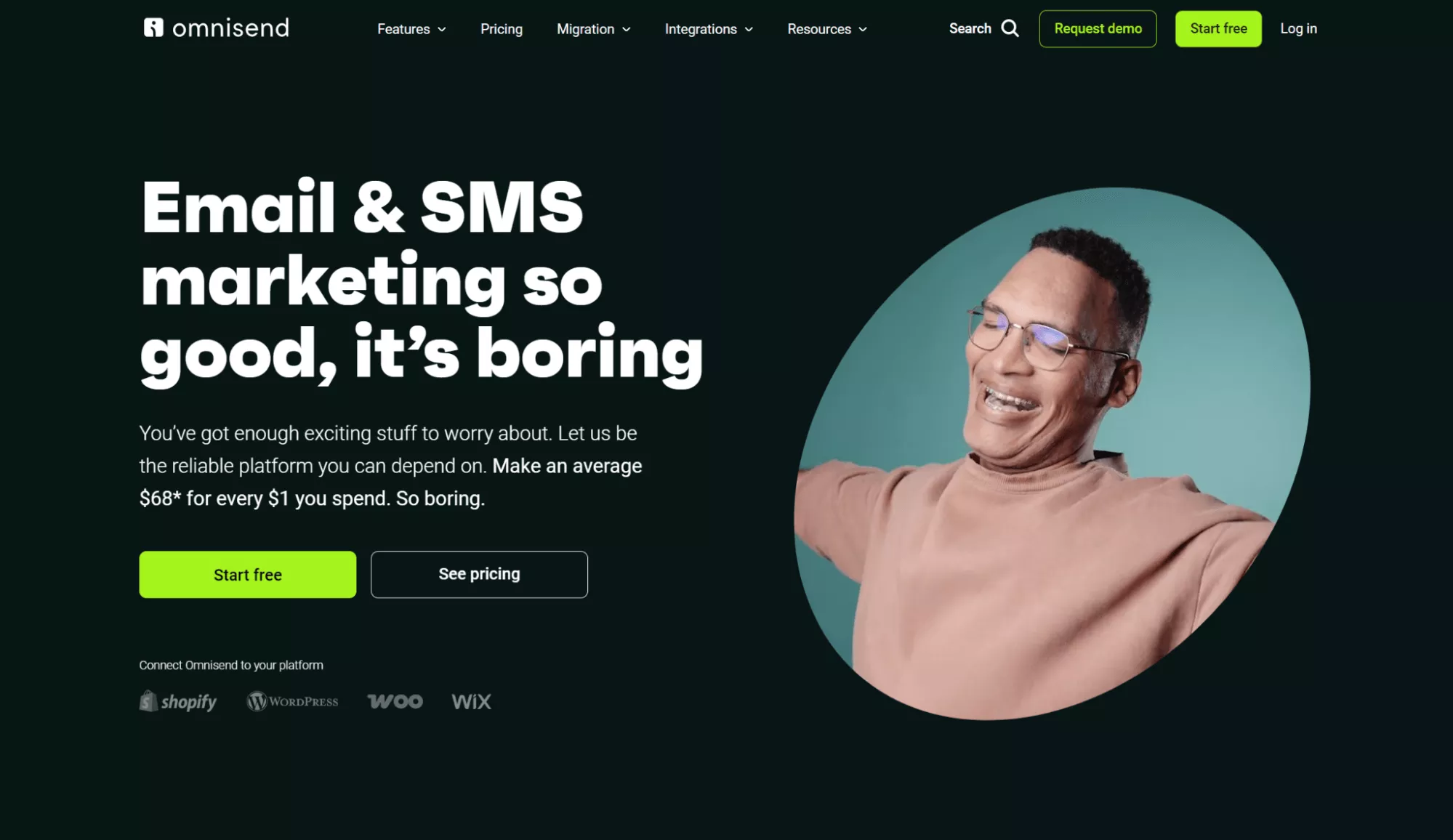
G2 rating: 4.6/5 (based on 900+ reviews)
Best for: Ecommerce stores of all sizes, Shopify users, complex automations
Why it’s a great Sender alternative
Omnisend is a full-featured omnichannel marketing platform for email, SMS, and push. Unlike Sender, which restricts advanced automations to its Professional plan, it provides all automations across all plans and handles more complex workflows for ecommerce.
Designed to support every stage of the customer journey, Omnisend offers comprehensinve segmentation, personalization, and seamless ecommerce integration. It also syncs directly with your store to track revenue and sales
Pros
- No steep learning curve
- All standard features across every plan
- 25+ pre-built automations and an intuitive workflow builder
- Professional email templates
- A/B testing
- Unlimited segmentation with pre-built segments
Cons
- Not as many integrations as some competitors
- Free plan unsuitable for businesses with large contact lists
Pricing
- Free: Send 500 emails/month to 250 contacts
- Standard: $16/month to send 5,000 emails/month to 500 contacts
- Pro: $59/month to send unlimited emails to 2,500 contacts
2. Brevo – Affordable features for small businesses
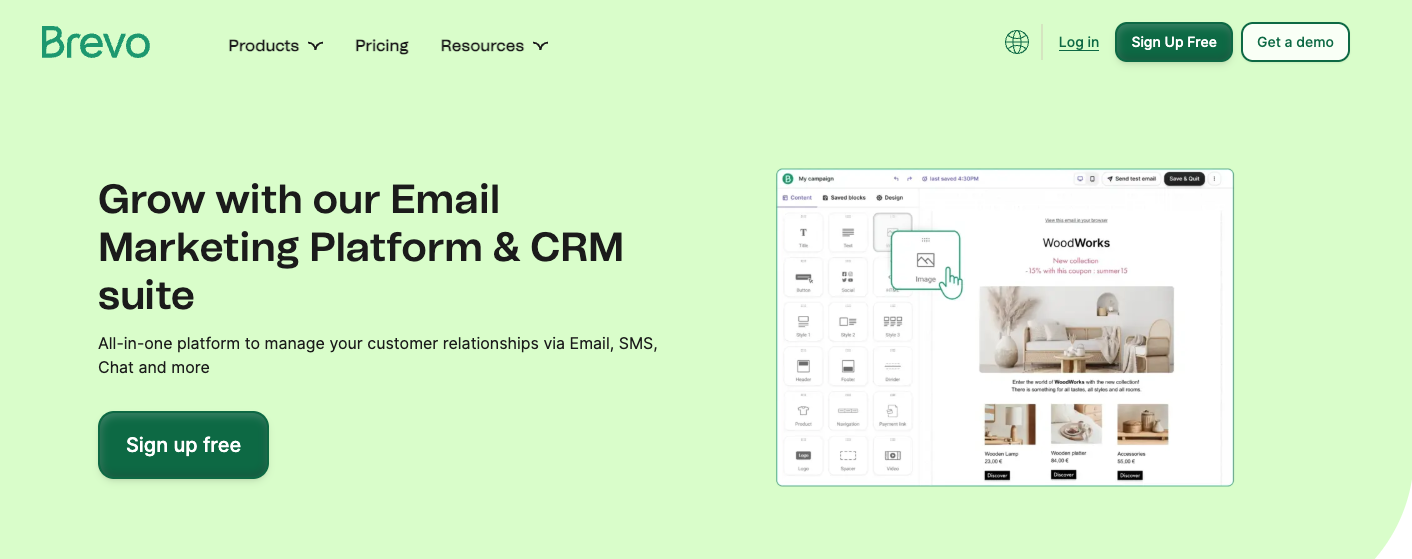
G2 rating: 4.5/5 (based on 2,200+ reviews)
Best for: Bulk campaigns, basic automations, SMEs
Why it’s a great Sender alternative
Brevo’s paid plans start at $9/month (a dollar less than Sender’s) with no daily sending limit for mass emails. It supports transactional emails across all plans with real-time email statistics and dynamic content for abandoned carts and order confirmations.
Pros
- Cheaper than Sender
- Provides all automations from the free plan
- AI content generator
- Email template library
- Customizable signup forms
- Huge contact list limits (100,000 to unlimited)
Cons
- Automations don’t handle complex workflows
- Tiered features, including:
- No popups (custom Enterprise plan needed)
- No phone and chat support below the Business plan
- No advanced open and click analytics below the business plan
Pricing
- Free: 300 emails/day
- Starter: $9/month, no daily sending limit
- Business: $18/month, unlocks advanced features
3. Moosend – Tools for email marketing newbies
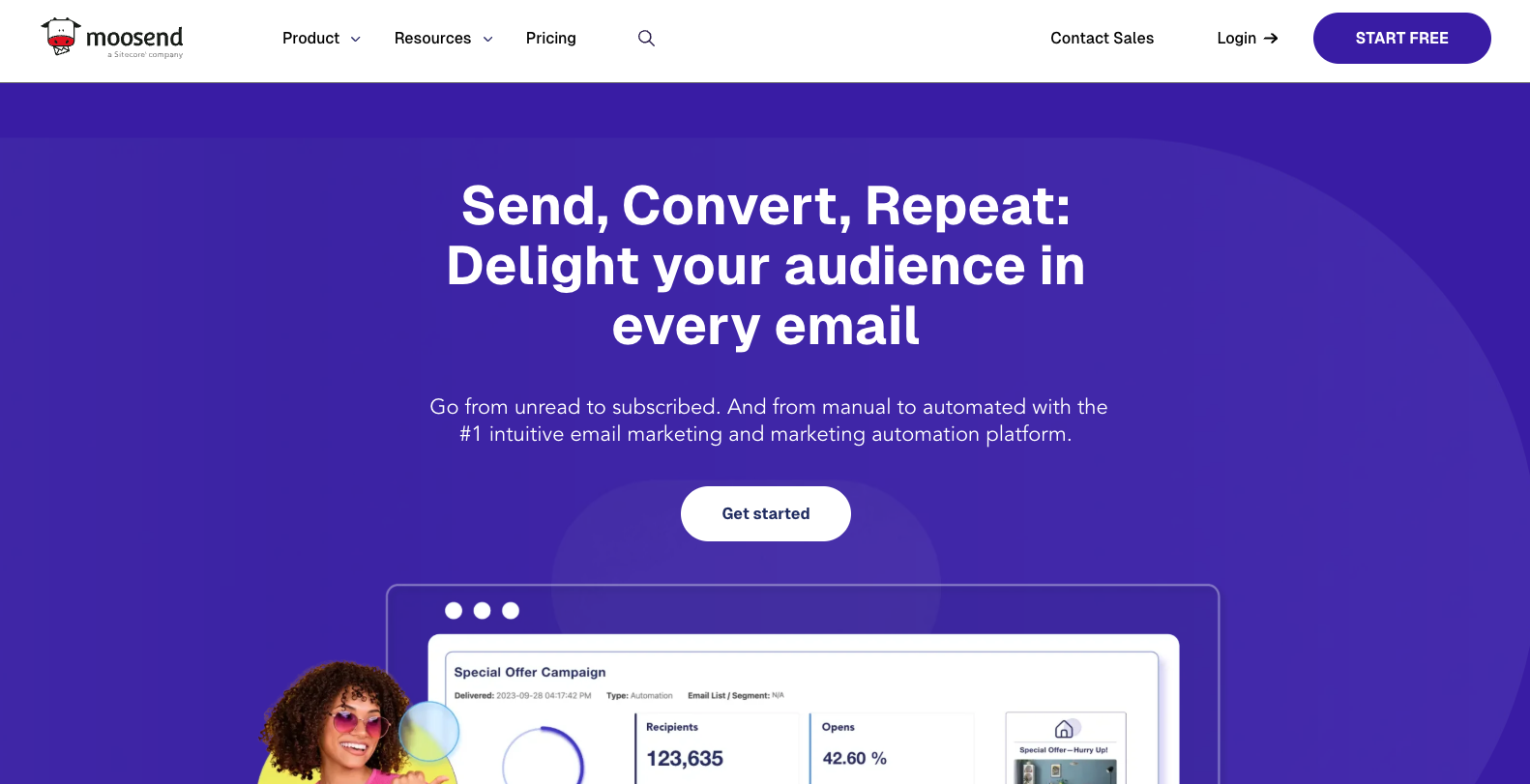
G2 rating: 4.7/5 (based on 700+ reviews)
Best for: SMEs with less complex automation requirements
Why it’s a great Sender alternative
Moosend doesn’t have a free plan, but its paid plans start at $9/month for 500 contacts and unlimited email campaign sends. It’s one of the best-rated tools on G2 and supports multi-step automation workflows across all plans.
Pros
- Intuitive email builder
- Landing pages and forms
- AI recommendations
- Automation workflow builder
- Detailed analytics across all plans
Cons
- No free plan
- Only one paid plan with published pricing
- Transactional emails are unavailable in the Pro plan and only available as an add-on in the custom-priced Moosend+ and Enterprise plans
Pricing
- Pro: $9/month for unlimited campaign sends and 500 contacts
- Moosend+: Custom allowance plan with “When someone browses any page” and “When someone views any product” triggers
- Enterprise: Custom plan with priority support and an account manager
4. MailerLite – Suits promotional campaigns
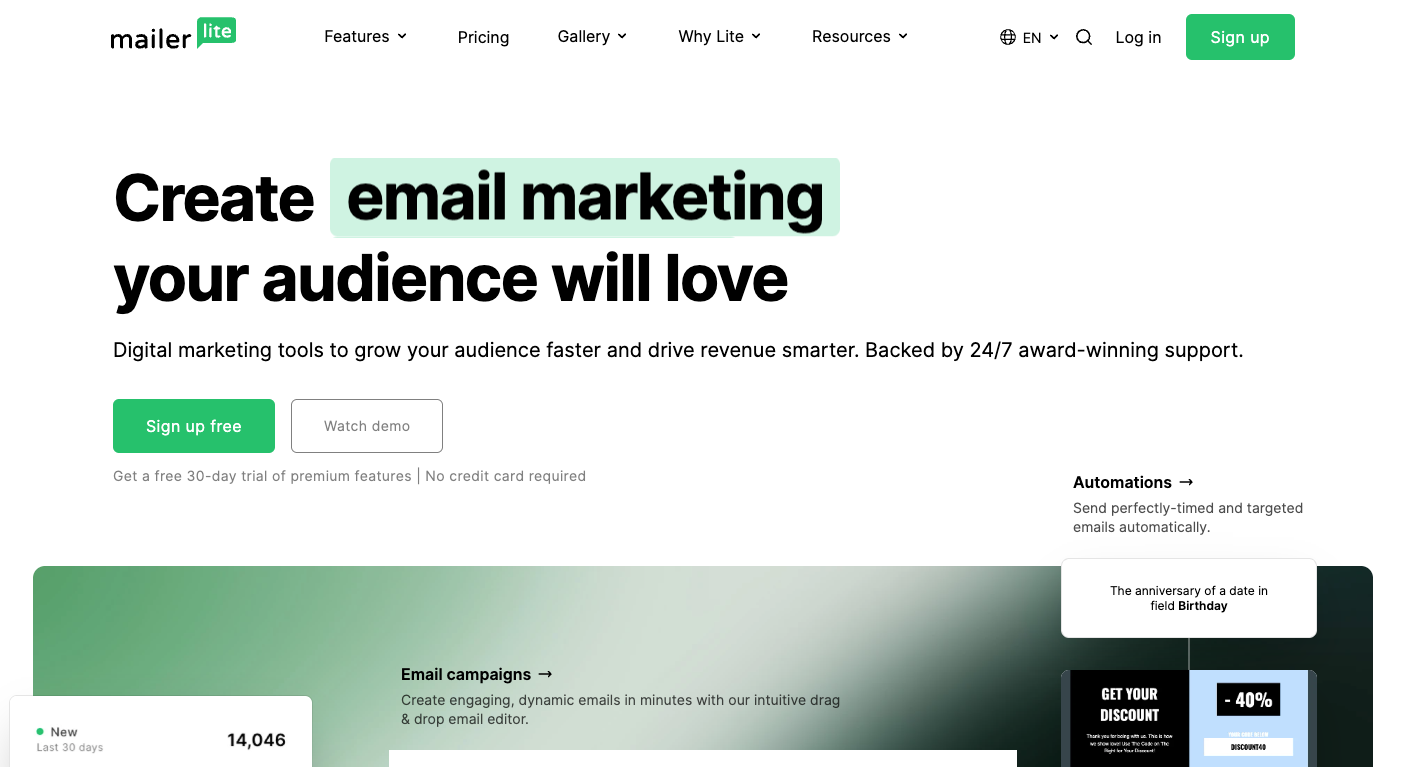
G2 rating: 4.6/5 (based on 1,000+ reviews)
Best for: Businesses with large sending requirements
Why it’s a great Sender alternative
MailerLite has a generous free plan with 12,000 emails/month and a low-cost $10/month plan with unlimited monthly emails. It handles marketing campaigns and automations with helpful features like campaign auto-resend and multivariate testing.
Pros
- Email automation builder supporting 100 steps
- Pre-built automations
- Landing pages, forms, and popups
- Unlimited segmentation
- Drag-and-drop newsletters
Cons
- Transactional email and SMS is a separate plan
- Pricing is based on subscriber count and gets expensive as you scale
- Promotion popups and Facebook Custom Audiences only on the Advanced plan
Pricing
- Free: For up to 1,000 subscribers, 12,000 emails/month
- Growing Business: $10/month for 500 subscribers, unlimited emails
- Advanced: $20/month for 500 subscribers, smart sending and enhanced automations
- Transactional Email and SMS: This separate plan extends MailerLite Marketing functionality with a free plan for 3,000 emails/month and paid plans starting from $35/month for 50,000 emails
5. GetResponse – Complete marketing suite
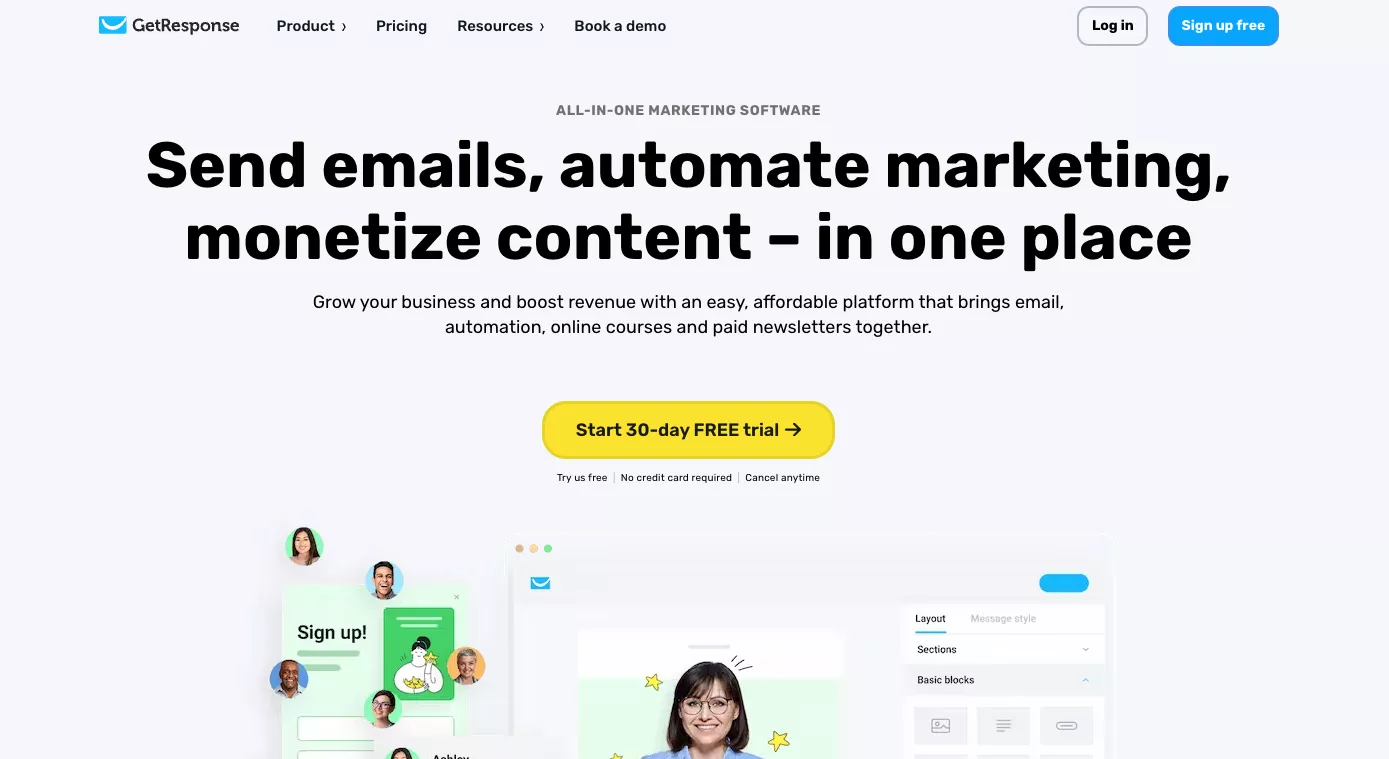
G2 rating: 4.3/5 (based on 770+ reviews)
Best for: Promotional emails, medium-sized businesses
Why it’s a great Sender alternative
GetResponse has more pre-built automations than Sender, including for visited URLs, event-based triggers, and purchases. It handles unlimited push notifications from its Marketer plan (Sender doesn’t support push) and includes an onboarding session across all plans.
Pros
- Unlimited monthly email sends on all plans
- Extensive template library
- Automation templates
- Autoresponders series
- Website builder in the Creator plan
Cons
- Limited segmentation in Starter plans
- Purchase automation, abandoned cart triggers, and visited URL automations are only available in the Marketer plan and above
Pricing
- Free: 2,500 emails/month
- Starter: $19/month, unlimited monthly emails
- Marketer: $59/month for more advanced automations, recommended products, promo codes, and other handy ecommerce features
- Creator: $69/month, includes a website builder and features for monetizing knowledge, such as quizzes and a mobile app for students
- Enterprise: Custom pricing, with priority support and a dedicated IP address
6. AWeber – Helps you sell products and services

G2 rating: 4.3/5 (based on 600+ reviews)
Best for: Creators, growing ecommerce stores
Why it’s a great Sender alternative
AWeber caters to creators with web push notifications, ecommerce tools for selling (0.6% transaction fees), and AI subject line assistance. Free users get sales tracking, landing pages, and support for up to 500 subscribers.
Pros
- Free plan available for up to 500 subscribers
- Web push notifications in all plans
- Drag-and-drop email builder
- AI Subject Line Assistant
- Landing page builder with templates
Cons
- Limited automations in lower-tier plans (one in Free, three in Lite)
- Email sending is capped at multiples of the subscriber count
Pricing
- Free: For up to 500 subscribers, 3,000 emails/month
- Lite: $15/month for unlimited subscribers, 10x subscriber count in emails/month
- Plus: $30/month for unlimited subscribers, 12x subscriber count in emails/month
- Unlimited: $899/month for unlimited subscribers, 15x subscriber count in emails/month
7. Benchmark Email – Simplifies email marketing

G2 rating: 4.3/5 (based on 100+ reviews)
Best for: Beginners, small ecommerce stores
Why it’s a great Sender alternative
Benchmark offers behavior-based automation with if/then sequences that adapt to subscriber actions. It also provides mobile-friendly templates, comprehensive analytics, and simple list-building tools without technical expertise.
Pros
- Smart Design AI for quick, branded email creation
- Mobile-responsive templates for all industries
- Forms, popups, and landing pages for list-building
- Built-in A/B testing tools
- If/then automation sequences
Cons
- Advanced segmentation is only available in paid plans
- Limited automation in the free tier
- The Pro plan limits you to 25 signup forms
Pricing
- Free: For 500 contacts, 3,500 emails/month
- Pro: $15/month for 500 contacts, 7,500 emails/month
- Enterprise: Custom pricing with managed account setup
8. Mailchimp – A familiar and reliable tool
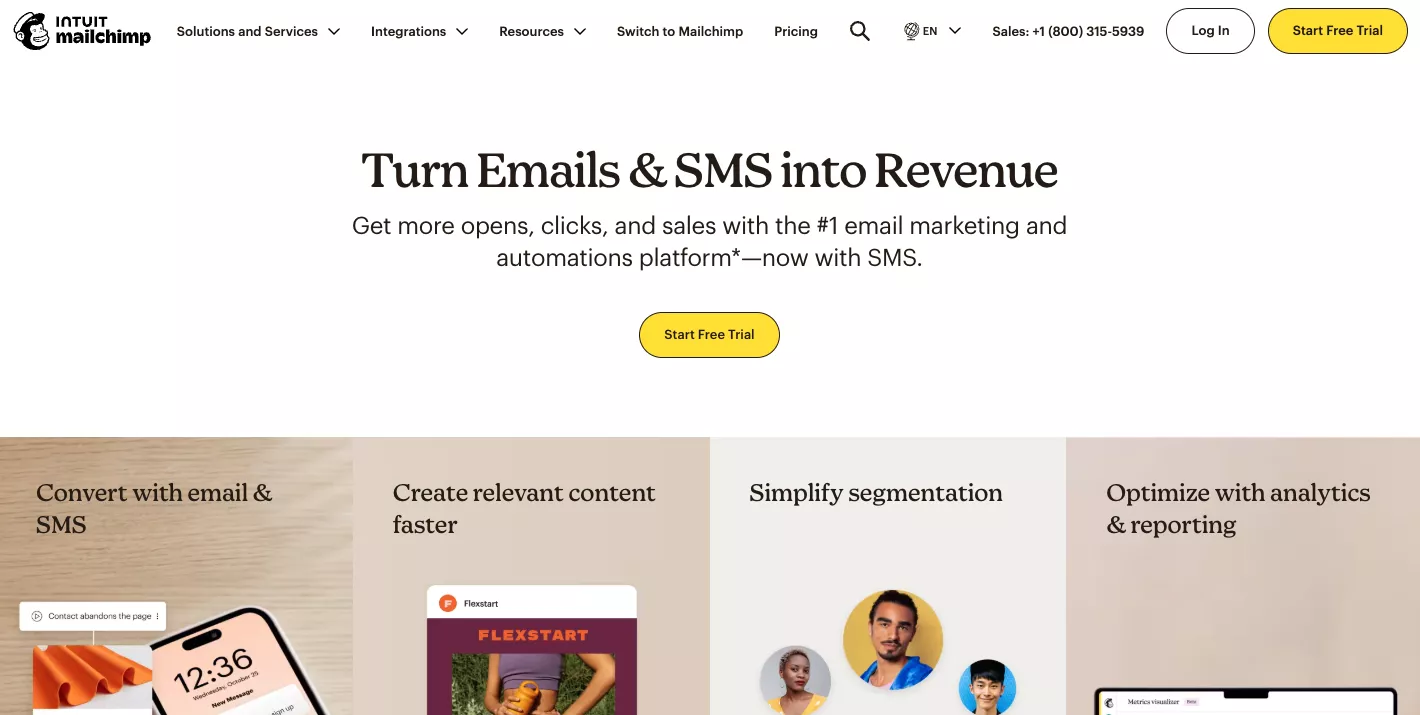
G2 rating: 4.3/5 (based on 12,700+ reviews)
Best for: Audience insights, behavioral targeting, and service businesses
Why it’s a great Sender alternative
Mailchimp gives you access to audience insights, such as predicted demographics and purchase likelihood. You can build multi-step customer journeys with branching logic based on subscriber actions.
Pros
- Multi-step customer journey builder with branching points
- Behavioral targeting based on purchases and app engagement
- Website and landing page builder included
- Audience insights with predicted demographics
- 300+ app integrations (Shopify, Canva, WooCommerce)
Cons
- Free plan limited to 500 contacts and 1,000 emails/month
- Advanced features are restricted to higher-tier plans
- More expensive than competitors for growing lists
Pricing
- Free: $0/month for 500 contacts, 1,000 emails/month
- Essentials: $13/month for 500 contacts, basic features
- Standard: $20/month for 500 contacts, advanced automation
- Premium: $350/month for unlimited contacts, advanced features
9. Drip – Excels for customer segmentation
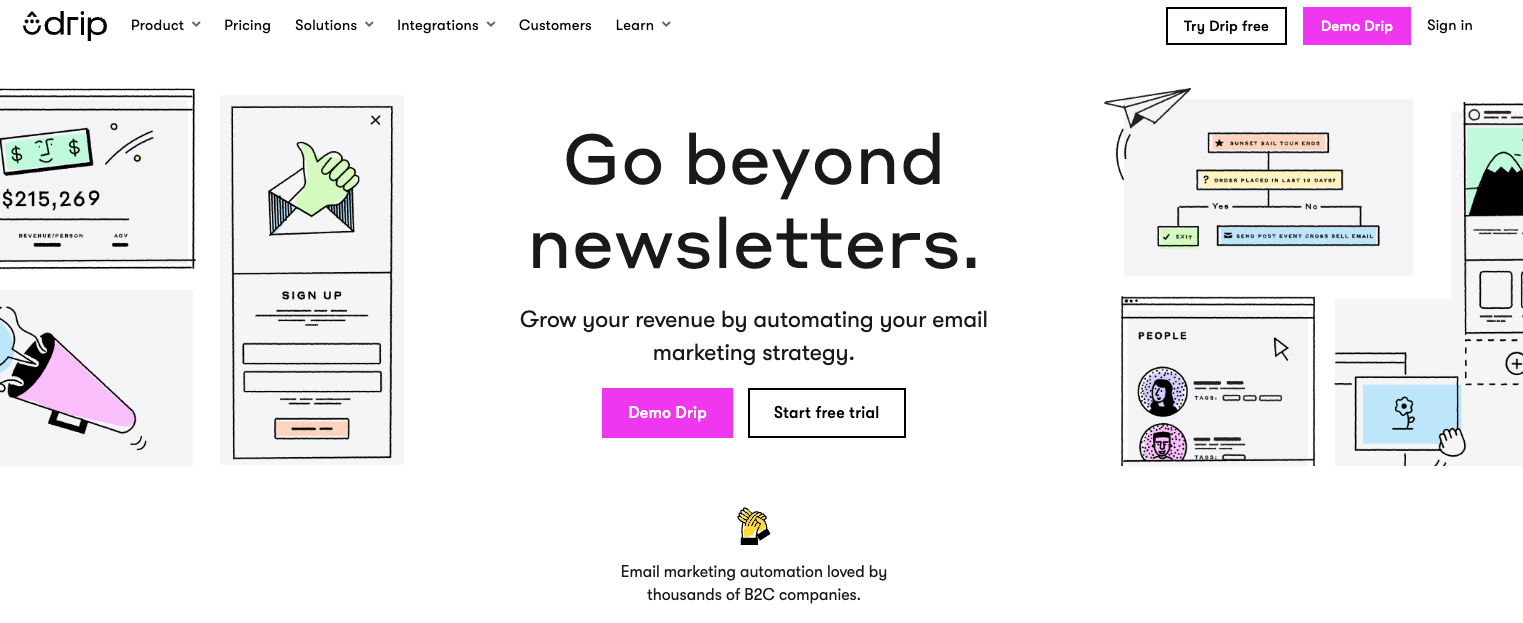
G2 rating: 4.5/5 (based on 460+ reviews)
Best for: Businesses with small contact lists but large sending requirements
Why it’s a great Sender alternative
Drip offers point-and-click product insertion into emails and customer segmentation for VIPs, first-time buyers, and dormant shoppers. Its visual builder supports dynamic content and A/B testing to create engaging messages.
Pros
- Unlimited email sends
- Visual drag-and-drop workflow builder
- Behavioral segmentation that updates automatically
- 99.8% email delivery rate
- Multi-channel marketing (email, social, onsite)
Cons
- Higher starting price than some competitors
- Limited to 50 workflows on standard plans
- Learning curve for complex segmentation features
Pricing
- Free trial: 14 days, no credit card required
- Paid plan: $39/month for up to 2,500 subscribers
10. Constant Contact – Expert-supported email and marketing platform
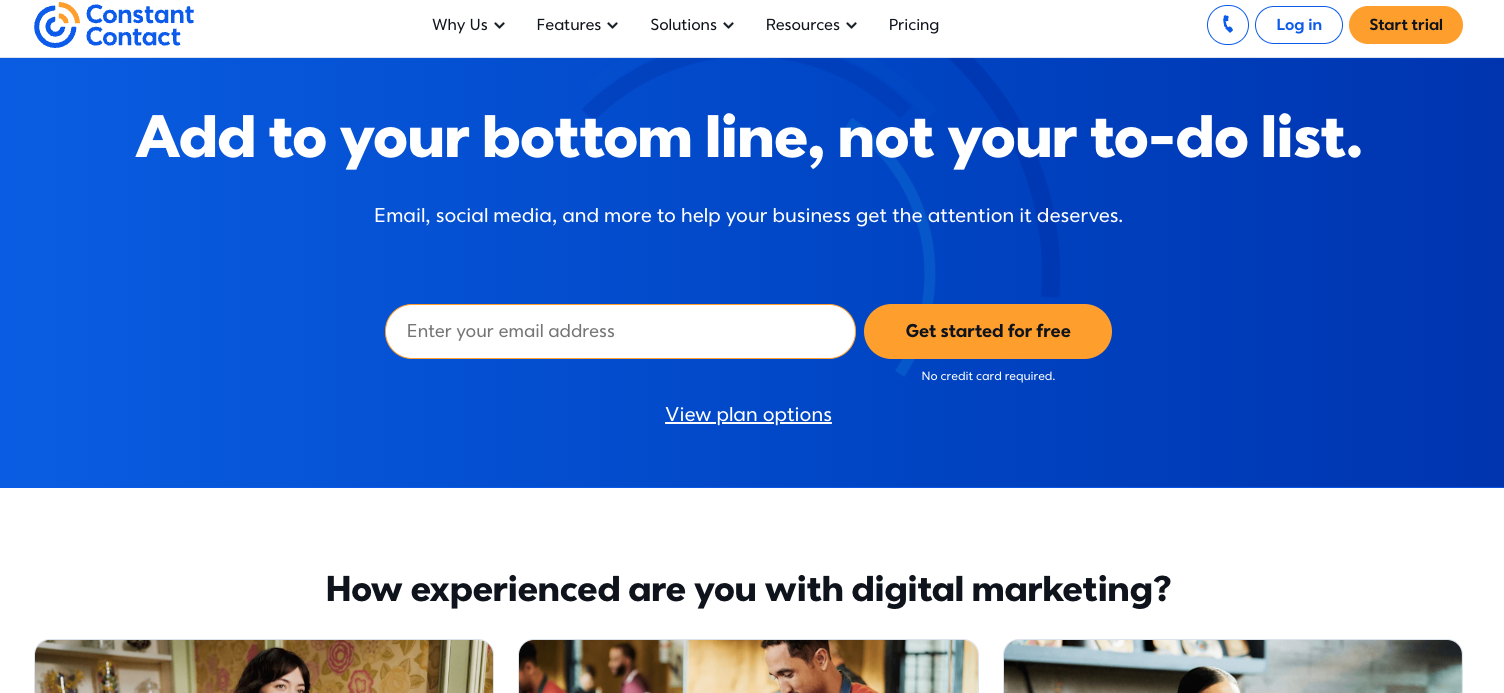
G2 rating: 4.1/5 (based on 6,500+ reviews)
Best for: Businesses looking for email marketing with social media integration
Why it’s a great Sender alternative
Constant Contact delivers 97% of emails to inboxes. The platform offers social media management, event hosting, product sales, and email marketing, with 1:1 expert onboarding support. Its drag-and-drop editor includes AI copy generation and subject line testing.
Pros
- Live phone and chat support with marketing experts
- Social media scheduling across multiple platforms
- Event hosting and payment processing
- Supports automations and campaigns
Cons
- No free plan
- Limited automation options in lower-tier plans
- Higher starting price than some competitors
- Segmentation restrictions on basic plans
Pricing
- Lite: $12/month for 500 contacts, basic features
- Standard: $35/month for 500 contacts, automation features
- Premium: $80/month for 500 contacts, advanced features
Conclusion
Omnisend is the best Sender alternative for ecommerce stores due to its unrestricted automations that cover more workflows. For instance, Sender only supports transactional emails from its most expensive Professional plan, while Omnisend offers them on all plans.
If it’s an email marketing tool for a small business you want, then Brevo’s $9/month pricing, no daily sending limits, AI content generator, and basic automations work well. MailerLite and Moosend offer similar values at $10/month and $9/month, respectively.
We recommend trying two or three platforms to assess usability, features, and capabilities. Read reviews on G2, and if you’re migrating from Sender, check how easy it is to transfer data and sync your tools.
Quick sign up | No credit card required
This article was researched and written by our experts following a precise process.
See the processTABLE OF CONTENTS
TABLE OF CONTENTS


No fluff, no spam, no corporate filler. Just a friendly letter, twice a month.

 OFFER
OFFER







